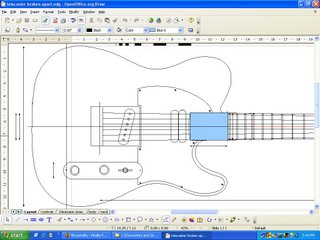Mashups are a really interesting Web 2 development. Typically the functionality of google maps or some other application is combined around a community of interest to create some sort social utility. There are a couple that I really like: garbagescout for its recycling funkiness, and
publicLoos: A Google Maps Mash-up of Public Restrooms in San Francisco which is kind of funny, Flickrscape for it's topic specific slideshows created from a topic search within Flickr and gvisit which allows you to see where your website visitors have come from. Virtual Tourism is one I haven't seen before which seems to have promise as well.
Friday, April 14, 2006
Free Office Suites: opensource online and the open telecaster
 There is not a person alive who does not like something for nothing. Especially when it comes to software and the days of having to pay for your office suite seem to be coming to an end. At the very least there are now very usable, practical alternatives to computer users with an Internet connection. I have been using Openoffice or Sun office before it for at least ten years with few complaints except that sometimes the tables went a bit wonky when opened with the Microsoft product. The advantages of using openoffice include the ability to export your files to pdf ( improving printability - most important for online resources)and swf. I recently discovered that open office draw has the ability to open dxf (CAD)files as well and a recent project of mine " the open telecaster" ha ha - yes I am having a go at making my own guitar- has been drawn up using a free blueprint from the net brought up to life size proportions to test it's accuracy with draw and from which I created a template using masonite. Now that what I call cool--- free plan, free software, recycled timber,all hand tools, to build an item hopefully of enduring musical value. Anyway back to the point there are some excellent online office alternatives as well including:
There is not a person alive who does not like something for nothing. Especially when it comes to software and the days of having to pay for your office suite seem to be coming to an end. At the very least there are now very usable, practical alternatives to computer users with an Internet connection. I have been using Openoffice or Sun office before it for at least ten years with few complaints except that sometimes the tables went a bit wonky when opened with the Microsoft product. The advantages of using openoffice include the ability to export your files to pdf ( improving printability - most important for online resources)and swf. I recently discovered that open office draw has the ability to open dxf (CAD)files as well and a recent project of mine " the open telecaster" ha ha - yes I am having a go at making my own guitar- has been drawn up using a free blueprint from the net brought up to life size proportions to test it's accuracy with draw and from which I created a template using masonite. Now that what I call cool--- free plan, free software, recycled timber,all hand tools, to build an item hopefully of enduring musical value. Anyway back to the point there are some excellent online office alternatives as well including:goffice
thinkfree
writely
zoho virtual office
Last time I looked I liked thinkfree the best of these.
Thursday, April 13, 2006
Windows Live Academic

The use of journal databases as a source of referenced content has always been one of the advantages of running a course from the internet. Students have access to a wide range of peer reviewed content from reputable sources. Finding this content has usually required logging in to a database provider via an institution that has set up accounts for it's students.The site allows the user to search academic papers, weblog feeds, the web , news, images etc. It also allows individual user customisation of the site via the use of macros. Windows Live Academic This looks really good and could change the way search is conducted.
Wednesday, April 12, 2006
Blackboard vs Moodle
This is an interesting study of the relative levels of satisfaction with blackboard and moodle from a student prespective. Blackboard vs Moodle
Web 2 e-learning and the bureaucratisation of the learning management system.

It might just be me but it seems that the innovations of the web 2 revolution have not really filtered into the e- learning realm. Sure there are no doubt many instances of web 2 apps being utilised within an LMS but there are no real examples of web 2 applied to the whole LMS. There are examples: nuvvo http://nuvvo.com/ for instance is promising,as is schooltool http://www.schooltool.org/and more recently chalksite http://www.chalksite.com/ but nothing as yet approaching the power of the much maligned LMS. What I think we are all waiting for is an LMS that has lots of features combined with the ease of use of many of the popular web 2 apps. I think we are waiting for something that gives the power back to the teacher to decide what content they consider appropriate for their students,and which can be updated on the fly with content updated as is needed. Maybe it is the bureaucratisation of the Learning Management System that is the real problem and not the technology itself. Asp or php of themselves are surely not the problem. The problem is probably the misuse of these technologies to serve purposes that have not been fully examined. Why for instance is there so much emphasis on control over and above that exercised by the teacher? These are bureaucratic concerns about the utilisation of new teaching methods even though it is at least ten years since they could have been considered new.
Subscribe to:
Posts (Atom)